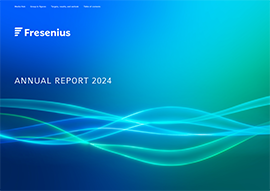Our Material Sustainability Topics
Based on the outcomes of the materiality assessment 2023, we consider following topical standards of the European Sustainability Reporting Standards as material:
- Climate change
- Pollution
- Water and marine resources
- Resource use and circular economy
- Own workforce
- Workers in the value chain
- Consumers and end-users
- Digitalization
- Innovation
- Business conduct
- Cybersecurity
Our materiality analysis is based on the principle of double materiality and complies with the requirements of the European Sustainability Reporting Standards. The aim is to identify the material impacts, risks, and opportunities that arise in our own business and along our value chain. The sustainability aspects that are relevant for us and our stakeholders arise from this.
In line with the principle of double materiality, we have considered sustainability from two different perspectives:
- Impact materiality: includes all potential and actual positive and negative impacts of Fresenius’ operations on our stakeholders, including social and environmental impacts
- Financial materiality: includes all financial risks and opportunities that could affect Fresenius’ future profitability due to sustainability aspects. This encompasses the financial performance, results of operations, cash flows, access to finance or cost of capital of Fresenius.
A sustainability aspect fulfills the double materiality criterion if it is material from either or both perspectives.
Stakeholders and partnerships
Fresenius is integrated into a diverse network of interest groups. From this exchange, we gain valuable insights that help us to continuously improve the management of material topics and reporting.
We engage with our stakeholders through a variety of channels. The corporate functions at Fresenius primarily focus on stakeholders who are relevant to the Group as a whole. The business segments actively engage with patients, employees, customers, and regulatory authorities, among others.
For the integration of affected stakeholders in our operating activities, we consider, for example findings from existing due diligence processes and risk assessments in the area of quality, internal employee satisfaction surveys, dialogs with employee representatives and works councils, patient and customer surveys. Another important element of our stakeholder dialogs is our active participation in industry and interest groups, as well as our exchange with business partners.

For more information on this topic see the Sustainability Statement.
Contact
If you have any questions about sustainability, please contact us:
sustainability@fresenius.com


